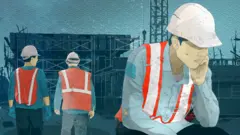Thousands of North Koreans are reportedly being sent to work in extremely harsh conditions in Russia, addressing a significant labor shortage worsened by Russia’s ongoing invasion of Ukraine. Sources indicate that Moscow has tapped Pyongyang for assistance in the war, utilizing its missiles, artillery shells, and soldiers. South Korean intelligence officials reveal that with many Russian men engaged in fighting or fleeing, Russia is increasingly relying on North Korean laborers.
Interviews with six North Korean workers who escaped Russia since the conflict began reveal the grim conditions. These men described long, grueling workdays and tight control by North Korean authorities to prevent escapes. Jin, a worker, recounted how upon his arrival in Russia, a North Korean security agent took him from the airport to a construction site, instructing him to avoid interaction and observation. He began working over 18-hour days building apartment blocks.
Interviews with all six workers paint a picture of 20-hour workdays, with just two days off annually. Their names have been changed for protection. The workers are confined to their sites, heavily monitored by North Korean security agents, sleeping in poor conditions either in overcrowded shipping containers or unfinished apartments. Despite injuries, like Nam’s fall, workers are denied needed medical care.
Previously, many North Koreans worked in Russia, generating significant revenue for Kim Jong Un. However, a 2019 UN ban aimed at cutting funds for North Korea’s nuclear ambitions led to many returning home. Recently, more than 10,000 laborers have been sent to Russia, with expectations for more arrivals.
North Korean workers can be found across Russia in various industries, including construction, clothing factories, and IT centers, despite sanctions banning their employment. Russian data showed a significant increase in North Korean entries in 2024, with many on student visas, a method believed to circumvent the UN ban.
The South Korean official suggested that some workers might also be employed in Russian-occupied Ukrainian territories. Andrei Lankov, an expert on North Korea-Russia relations, noted that North Koreans are a suitable solution for Russia’s labor shortage as they are cost-efficient and compliant.
Overseas construction jobs are highly desired by North Koreans for their better pay compared to domestic work. However, most earnings are allocated to the North Korean state, while workers receive a small fraction upon returning home. Disillusionment sets in due to the harsh work and low pay, with workers like Tae feeling “ashamed” when comparing to other nationalities, and Jin encountering derision from peers.
Despite strict monitoring, some workers have managed to escape, using acquired smartphones for communication and planning. Measures have tightened recently, with increased ideological sessions and reduced freedom. Activists report rarer escapes, and South Korean records confirm a decline in defections. Relations expert Lankov sees these workers as a lasting aspect of Kim and Putin’s alliance, persisting beyond the current conflict.
Additional reporting by Jake Kwon and Hosu Lee.

